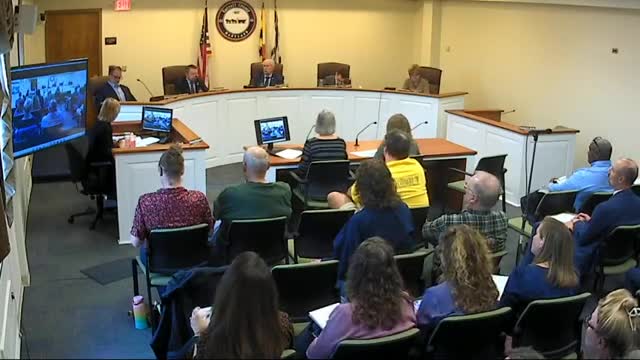Public hearing on cannabis reinvestment fund draws wide views on education, prevention and use of proceeds
Get AI-powered insights, summaries, and transcripts
Subscribe
Summary
A public hearing on how Carroll County should prioritize uses of its Community Reinvestment and Repair Fund (CRRF) drew arguments for school and youth programs, medical education, victim services, infrastructure such as weather sirens and objections based on federal law; the board left the record open for 10 days.
Carroll County held a public hearing Oct. 23 to gather community input on how to prioritize uses of the county’s Community Reinvestment and Repair Fund (CRRF), the portion of state cannabis revenue intended for communities disproportionately impacted by cannabis enforcement and related programs.
Staff told the board the county has received about $1.9 million in CRRF receipts to date—composed of quarterly distributions and one‑time conversion fees—and is receiving smaller recurring allocations (staff estimated roughly $250,000 a year based on current quarterly distributions). State law restricts funds to specified purpose areas (behavioral‑health crisis response; after‑school and truancy programs; housing and homelessness prevention; job training; childcare and recreation; reentry services for people impacted by incarceration; transportation improvements in high‑density transit areas; and related categories). The law also requires that programs benefit low‑income communities; in Carroll County, the law identifies ZIP code 21157 as a “disproportionately impacted” area with additional eligible flexibility.
More than a dozen speakers urged the commissioners to prioritize education, prevention and services rather than enforcement. Mount Airy council member Steven Demoter asked for funding to buy two weather alert sirens and to fund associated public education; he said sirens would help low‑income residents who lack smartphones or have cell dead zones.
Several speakers urged county support for broad cannabis education and clinical training. Rick Glass, founder of Canicares, said the county should fund “true cannabis education and not merely demonizing this plant” and urged training on the endocannabinoid system for clinicians. A nurse practitioner with a medical cannabis degree said clinician and public education about the endocannabinoid system is limited and urged education, safe‑access training and prevention. Tony O’Neil, a local hemp business owner, asked for funding for provider training, community education and small‑business compliance assistance.
CARE (a domestic‑violence and sexual‑assault victim services nonprofit) asked that CRRF fund victim‑services expansion, citing increased demand for helpline calls, forensic‑exam accompaniments and counseling. Human Services Program CEO Scott Yard and other nonprofit leaders asked that the county consider one‑time capital purchases (vans, mobile clinics or office space) that nonprofits can’t otherwise buy with tightly restricted grants.
Other commenters asked the commissioners to prioritize funding for schools and after‑school programs for low‑income students in ZIP code 21157; one commenter said the funds should be used for school supplies, food and after‑school programming. Some speakers opposed accepting the funds at all on legal grounds, citing federal law and the Controlled Substances Act; one commenter urged the board to reject the proceeds until cannabis is legalized at the federal level.
Commissioners closed the public hearing and voted to leave the record open for 10 days to collect written comments and emails; staff said they will summarize the input and return with proposed priorities and an RFP structure for grantees. Staff told the board that CRRF funds may not supplant existing local government funds and that the county’s first RFP will emphasize community‑based organizations serving low‑income residents and projects that address transportation barriers where possible.
